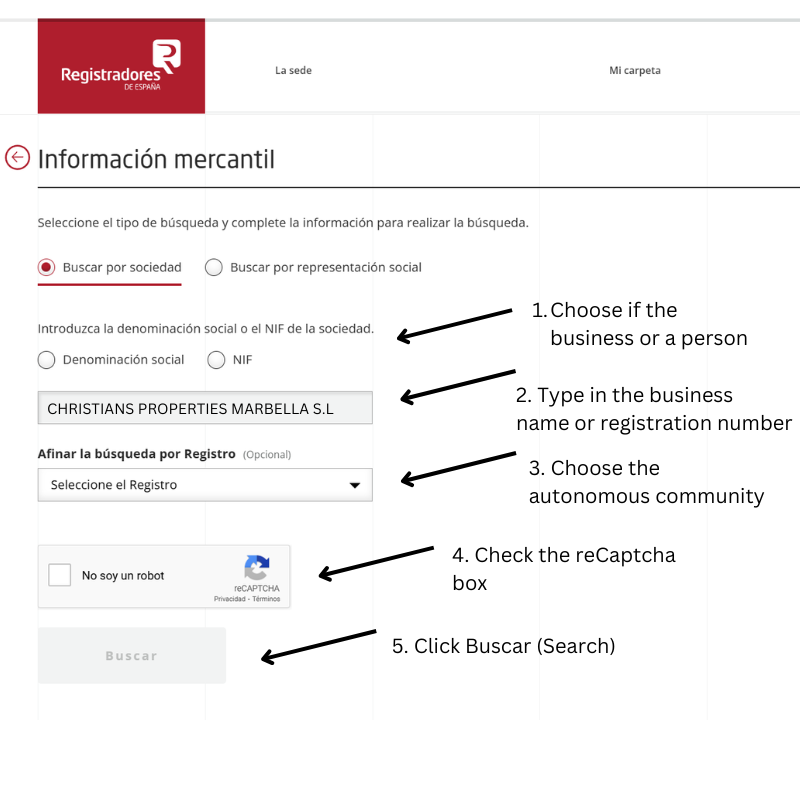
Buying property in Spain can be a dream come true—if you have the right estate agent by your side.
But how can you tell if your estate agent is truly trustworthy?
Unfortunately, working with unregistered or unverified agents can lead to serious risks.
In this guide, we provide practical steps to help you identify whether an estate agent is legitimate, so you can proceed with confidence in your Spanish property purchase.
Table of Contents
The Risks of Using Unregistered Agents
Engaging with unregistered agents can have severe consequences. Here are some specific examples of the risks involved:
- Legal Complications: Unregistered agents may fail to ensure all paperwork is properly managed, which can result in incomplete documentation or even contracts that are unenforceable under Spanish law. For example, without proper contracts, you could face issues if a dispute arises about property ownership, leading to a costly and prolonged legal battle.
- Property Ownership Disputes: If the agent doesn’t conduct proper due diligence, you could end up buying a property with unclear ownership titles or unresolved disputes, putting your entire investment at risk. It’s not uncommon for unregistered agents to misrepresent the ownership status of a property, leading to disputes and challenges from previous owners or other stakeholders.
- Planning Permission Problems: These agents may misrepresent planning permissions or ignore building regulations, leading to unexpected legal battles, fines, or even demolition orders. For instance, some unregistered agents might promise that certain modifications are permitted when they actually lack the required planning permissions, exposing you to potential fines and enforcement actions.
- Hidden Fees and Commissions: Unscrupulous agents often surprise buyers with hidden charges or inflated commissions, significantly increasing your costs. Many buyers have been caught off guard by unexpected charges at closing, such as administrative fees that were never disclosed upfront.
- Cash Payment Limits: It’s important to note that cash payments over €1,000 are illegal when one party is a business or professional. For non-residents, who can prove that they are not tax residents, this limit is €10,000. Exceeding these limits can result in a 25% fine on the cash amount for both the payer and the recipient. , so always avoid making significant payments in cash. In addition to fines, using cash for large transactions can increase the risk of fraud, as there is little traceability in such payments.

- Red Flags to Watch For: Be wary of unrealistic promises, such as guarantees of returns or fast-track legal processing. Pressure tactics, such as insisting you make a deposit immediately, or the refusal to provide written agreements, are strong indicators of an unreliable agent. residents, this limit is €10,000.
1. Secure Websites Are a Must: HTTPS Matters
A secure website is the first indicator of a professional estate agent. Check if the agent’s website uses HTTPS (look for the padlock symbol in the address bar). This ensures your personal information is protected and signals that the company takes security seriously.
A website without HTTPS may also be flagged as “Not Secure” by your browser, which is a sign that the company is not taking proper steps to protect your data.
2. Legal Pages: Terms, Conditions, and Privacy Policy
Legitimate agents are transparent. Look for important legal pages like Terms and Conditions, Privacy Policy, and Legal Notice (Aviso Legal). These indicate the agency is committed to protecting clients and is complying with Spanish law.
Quick Tip: If these legal pages are missing, it’s a red flag. Reputable agents always follow regulations to safeguard their clients. Legal pages provide insight into how the agent handles data, their obligations to clients, and what legal recourse is available if something goes wrong.
3. Contact Information: A Physical Presence Matters
Always verify if the agent provides a legitimate office address. Reputable businesses will have a physical location that you can find. Check if their address is linked to Google Maps for easy verification.
Actionable Tip: Give the address a quick Google search. If it’s an empty lot or doesn’t exist, this is a huge warning sign. Also, look for multiple ways to contact the agent—such as phone numbers and email addresses—which adds credibility to their business.
4. Registered Identification: CIF, VAT Number, and Autónomo Details
Agents operating legally in Spain must have certain registered identification numbers:
- NIE (Número de Identificación de Extranjero): If you are a foreign buyer, you will need an NIE number. This is essential for any financial or legal transactions in Spain, including purchasing property. The NIE is your tax identification number in Spain and is required to register utilities, pay taxes, and finalize the purchase.
- CIF (Código de Identificación Fiscal): This is the Spanish equivalent of a company registration number, which verifies that the business is legitimate and registered for tax purposes.
- VAT Number: A legitimate agent conducting cross-border EU transactions will provide a VAT number. The VAT number ensures they are compliant with tax regulations, especially important if you are buying as a non-Spanish resident.
- Autónomo Registration: For independent agents working as freelancers, they must have an autonomo registration. This shows they comply with local laws and are operating legally.
You can verify these details via the Registro Mercantil Central website, where you can check if the business is properly registered. Taking the time to verify these credentials can save you from legal headaches down the line.

The website is very easy to use, even though it is in Spanish.
First find the details of the owner which should be on the website in the Legal documents or terms and conditions (usually the link is in the footer of the site). Then follow these steps:
- In Spain there are 2 types of company Self employed person (NIF) or Business (Denominación Social). If the name has letters like S.L or S.A after it as in the example, it is a Business and not a self employed person.
- Copy and paste the name of the company or the registration number.
- Select the region (this is also optional and should work without selecting it)
- Accept the Google reCaptcha
- Click “Buscar” which means send
Results

In the results, you should see the official name of the business, their registration number, where they are registered and if they are active (Vigente).
5. Professional Memberships and Regional Registers
In Spain, real estate agents may also be members of recognized industry bodies, such as the Agentes de la Propiedad Inmobiliaria (API), which shows they have undergone professional training and are committed to industry standards.
Regional Registries:
- Valencian Community: Agents must be registered as per Decree 98/2022. This includes areas like Valencia, Castellón, and Albatera. You can verify agent registration with the regional Valencian Registry
https://www.gva.es/es/inicio/procedimientos?id_proc=22518
- Community of Madrid: Registration is voluntary but still indicates a commitment to standards and ethical practices. You can check if an agent is listed in the Madrid Real Estate Registry.
https://sede.comunidad.madrid/inscripciones-registro/registro-agentes-inmobiliarios
- Andalusia: Registration is mandatory, adding credibility to an agent. If an agent isn’t listed, you should be wary. Check the Andalusian Real Estate Registry for verification.
https://www.juntadeandalucia.es/servicios/procedimientos/detalle/24390.html
- Balearic Islands: Agents must be registered in the official registry, which ensures compliance with local real estate practices. You can verify an agent through the Balearic Islands Real Estate Register.
https://www.caib.es/seucaib/es/tramites/tramite/4921099
Since regional rules differ, it’s vital to ensure the agent complies with the specific requirements of your desired location. Each region has unique laws, and understanding these can help you make an informed choice.
6. Reviews and Testimonials: What's Real, What's Not?
On-Website Reviews: Be cautious of customer testimonials posted directly on an agent’s website—these can easily be fabricated. Often, only positive reviews are displayed, which can give a biased impression.
Third-Party Reviews: Always cross-check reviews on external sources like Google Reviews, Trustpilot, or even on our platform, Trusted Estate Agents Spain, to explore genuine feedback from other buyers. Reviews on independent platforms are harder to fake and usually provide a more balanced view of the agent’s service quality.
7. Meet the Team: About Us Page and Real People
A trustworthy agent will provide a detailed About Us page, including profiles and photos of their team members. This adds transparency and reassures you that real people are behind the business. If the website lacks this information, consider it a warning sign.
Team Profiles: Look for detailed biographies, including their experience, credentials, and what they specialize in. This can help you assess whether the agent has the expertise necessary to guide you through your purchase.
8. Up-to-Date Listings and Content
An agent’s website should be regularly updated with current listings and useful resources. An inactive website could indicate an inactive or unprofessional agency. Check the dates on property listings to ensure they are recent.
Blog Posts and Guides: Look for agents with an active blog. Providing helpful content demonstrates they are engaged with industry trends and committed to educating their clients. Blog posts covering buying tips, legal changes, or regional insights show that the agent is knowledgeable and resourceful.
9. Trust Signals and Awards
Look for badges, certifications, or awards that add credibility. Reputable agents often display recognition received within the industry. Awards from respected bodies indicate that the agent has a proven track record of success and quality service.
SSL Certificate: Check if their SSL Certificate is current and professionally issued, as it shows they take data security seriously. An SSL-secured site is essential for protecting your personal information during transactions or inquiries.

10. Transparent Pricing
A professional agent will always be transparent about fees and commissions. Knowing upfront what you’ll be paying helps avoid any unpleasant surprises at the end of the process. Request a breakdown of all fees in writing to make sure there are no hidden costs.
Red Flags: If an agent is evasive about pricing, it could be a sign that they intend to add hidden charges later on. Always ensure that all costs, including administrative fees, taxes, and commissions, are clearly communicated.
11. Due Diligence on the Property Itself
Beyond checking the agent, it’s also crucial to conduct due diligence on the property itself. Here are some steps to ensure everything is in order:
- Currency Exchange: If you are transferring money from the UK or another non-euro country, make sure to use a reputable currency exchange service. Using a dedicated service can help you avoid unfavorable rates and save you a significant amount of money compared to standard bank transfers.
- Check for Debts: Properties in Spain can have outstanding debts attached to them, such as unpaid utility bills or taxes. Ensure that all debts are cleared before completing the purchase.
- Legal Issues: Verify that the property has no legal disputes or encumbrances. Your lawyer can conduct this search through the local land registry.
- Planning Permissions: Make sure any renovations or additions to the property have the correct planning permissions. Buying a property without these approvals can lead to costly legal issues or even demolition orders.
Tip: Always work with a qualified lawyer who specializes in Spanish real estate to help you with due diligence. They will have access to official records and can provide assurance that the property is free of any hidden liabilities.
12. Use Official Registers for Extra Peace of Mind
When in doubt, verify the agent’s credentials with official registers. You can use the Registro Mercantil Central to check if the agent is properly registered. This extra step can save you from a lot of headaches later on.
How to Use the Registry: Visit the official website and enter the agent’s business number or name. You can also specify the region to narrow down your search. This provides you with official confirmation of their legitimacy.
Ready to find a trustworthy estate agent in Spain?* Use our trusted reviews at https://trsutedestateagentsspain.com to ensure you’re in safe hands. Visit us today and make your property purchase with confidence!
